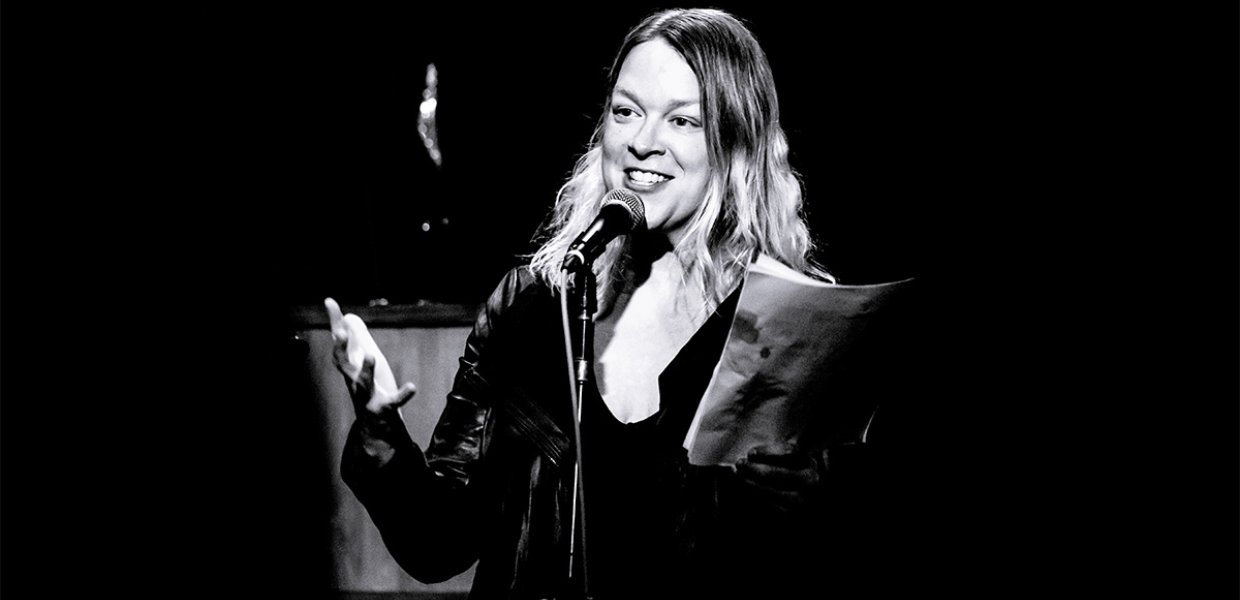A self-described “special geek” who cut class to go the library, Megan Stielstra found her calling as an author and educator while poring over novels by J. R. R. Tolkien, Ursula K. Le Guin, Margaret Atwood and Richard Wright.
“I was reading Black Boy, Wright’s memoir about growing up in the Jim Crow South,” Stielstra said. “In the chapter where he gets a library card, he describes reading novels about white characters written by white writers.” She recalls Wright’s wonder at the possibility of being in the head of someone different from himself. “It just cracked the world open for me,” she said.
Growing up in a small, predominantly white town in Southeast Michigan, Stielstra realized she wanted to learn how to move people through language — to better understand how to “share your brain and your heart with another person,” she said. Stielstra now brings her 20 years of experience having written three essay collections, as well as a career teaching creative nonfiction most recently at Northwestern, to her latest honor: 2021 Civic Media Fellow.
The Civic Media Fellowship at the USC Annenberg Innovation Lab, supported by the John D. and Catherine T. MacArthur Foundation, empowers artists, creators, storytellers, organizers working at the intersections of media, technology and culture.
Stielstra spoke with USC Annenberg about how her journey from the 16-year-old girl sitting on the floor of her school library to published author and scholar.
Share a little bit about how your past and how you grew as a writer.
I went to undergrad to learn how to write and had amazing teachers. I then went to grad school to learn how to teach and I paid for school by working as a bartender in a brunch restaurant for years. It was there that synapses started firing in my brain between the craft of oral storytelling and the craft of written storytelling. My bar customers are telling stories to get my attention because they want their Bloody Marys, right? So, they're using these tested and true literary techniques that Joan Didion and Toni Morrison and Kafka are using — like scene building, reflection, exposition, intention, and story movement. I was following all of these connections.
In addition to writing your own novels, you have brought the power of storytelling to your community. Talk about your work with Second Story.
In 2003 I helped start a personal narrative storytelling company in Chicago called 2nd Story. We teach writing and adult literacy through performance and storytelling. I spent 20 years working with storytellers across neighborhoods, and that really grounded me in the idea that stories help us see each other. That’s at the center of all of my work now, whether I'm writing for The New York Times, or I'm making my own weird books, or I'm supporting other people in sharing their own stories.
How did your work with the OpEd project start?
My work as a writer and my work as an educator are tangled together in all sorts of delicious ways. The OpEd Project supports writers that we don't normally hear in media and works to get their expertise and ideas into the public discourse. I signed on to the project about two weeks before the pandemic hit and worked with a fellowship of 20 very brilliant women in Dallas working across public service and nonprofit. These are people working in police departments, supporting young women who were survivors of sex trafficking; they’re working in politics, on campaigns, or with the census. I give them editorial support in writing their own opinion editorials, and then give them pitch support in getting those editorials out into the world.
How does the Civic Media Fellowship fit into the way you want to see your work evolve?
Civic media is such a broad endeavor. I find it incredibly powerful that the Annenberg Lab is putting practitioners from so many different corners of the conversation together to find points of connection. I think about how our separate work informs the greater whole. This whole brilliant cohort is living in my head when I think about civic media and what it can accomplish, and I’m thinking about my work in personal narrative in a more expansive way.
I’m so excited to be a part of this. We need one another. You can quote me right here; well, it’s not me exactly, it’s me quoting Buffy the Vampire Slayer, right at the end when she was about to take on the apocalypse. “There’s only one thing that can defeat evil, and that is us.”
I really believe in that collectivity.
